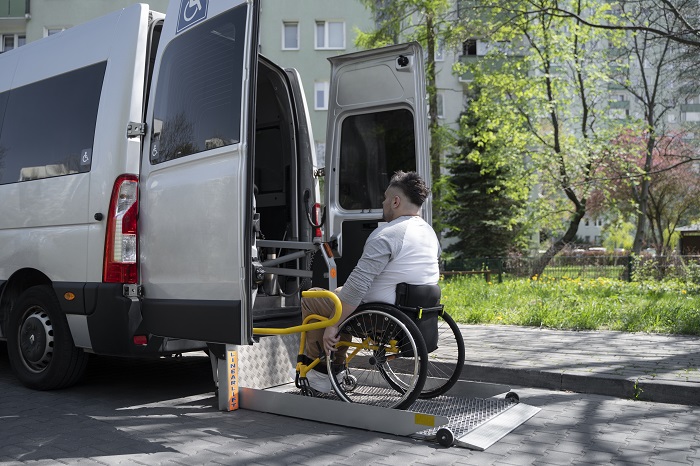Inclusion in the workplace is an ethical responsibility; however, it can also be a strategic advantage for any business. Adapted vehicles play a pivotal role in fostering a more inclusive environment, enabling companies to engage effectively with employees and clients with varying mobility needs.
Choosing to invest in accessible transport options means that businesses can enhance their reputation, boost employee morale, and create a more diverse workplace.
The Importance of Accessibility in Business
Accessibility in business goes beyond compliance with legal standards. It signifies a commitment to creating an environment where all individuals feel valued, included, and able to contribute. As you look for ways to attract a diverse workforce, consider providing adapted transport options. This will eliminate one of the significant barriers faced by potential employees with disabilities.
Disabling barriers in transportation demonstrates that a business values inclusivity, which can enhance its brand image. Businesses promoting accessibility are often viewed as industry leaders, encouraging employee and customer loyalty. Therefore, investing in transport solutions, particularly reliable wheelchair accessible vehicles, that accommodate all mobility needs is not just sensible—it’s essential for long-term success.
Additionally, fostering an accessible workspace can improve overall morale and team cohesion. When employees feel cared for and supported, they are more likely to engage positively with their work, colleagues, and your business as a whole.
Strategies for Implementing Adapted Transport
Implementing adapted transport solutions requires careful planning and consideration. Here are some effective strategies to ensure your business can meet the needs of all employees:
Assessing Employee Needs
Surveying within your organisation can help identify the specific requirements of employees who may benefit from adapted vehicles. Understanding transport needs allows you to make informed decisions about the types of vehicles to acquire. Information gathered can include preferences for vehicle features, such as ramp accessibility or designated seating.
This assessment can also help identify any additional support your employees require, such as training on using adapted vehicles or support with travel planning. Gathering feedback ensures solutions are tailored to individual needs, creating a more inclusive environment.
Partnering with Accessibility Specialists
Collaborating with experts in mobility can provide invaluable guidance. Accessibility specialists can help identify the best vehicles for your business needs, ensuring you choose options that maximise accessibility. These partnerships can also offer insights into best practices for maintaining these vehicles and ensuring they comply with regulatory requirements.
Specialists can advise on the latest innovations in transport technology, helping you to stay ahead of the curve. Leveraging their expertise means you can ensure that your transport offerings are compliant and equipped to provide the best experience for employees.
Training Staff
Educating all employees on how to utilise adapted vehicles effectively is crucial. Conducting training sessions can enhance understanding and remove any apprehension regarding accessibility features. Ensuring all employees are familiar with the features of the adapted vehicles contributes to a seamless experience for everyone.
Consider holding workshops that simulate various scenarios, allowing employees to experience using adapted transport firsthand. The more comfortable your team becomes with these vehicles, the more likely they will encourage their use among colleagues and clients.
The Role of Adapted Vehicles in Team Dynamics
Adapted vehicles can significantly improve team dynamics by making commuting easier for employees with mobility challenges. Employees with reliable transportation options are more likely to arrive at work on time and with less stress, contributing to a more positive workplace atmosphere.
Moreover, promoting adapted vehicles fosters a culture of support and understanding among team members. When everyone in the workplace has access to the same resources, it encourages collaboration and camaraderie. This inclusive environment enhances job satisfaction and overall productivity.
When there’s a shared responsibility for inclusivity, it can lead to increased communication and teamwork. Employees might share experiences related to accessibility, promoting discussions that enhance empathy and understanding among peers.
Creating a supportive culture around adapted transport is essential for its successful integration. Regularly celebrating and recognising the contributions of employees using these vehicles can reinforce their importance within the organisation.
Exploring the Financial Benefits of Inclusivity
Investing in adapted vehicles may seem significant, but the long-term financial benefits often outweigh the initial costs. For instance, you can reduce employee turnover and improve retention rates in your business. This is because employees who feel supported are less likely to leave, which translates to lower recruitment and training expenses.
Accessible transport can expand your customer base. Accommodating clients with mobility needs means your organisation can tap into new markets and enhance customer loyalty, further boosting revenue and reinforcing your brand’s commitment to inclusivity.
The Impact on Innovation and Growth
Those who choose to embrace inclusivity through adapted vehicles often experience increased innovation and growth. A diverse workforce brings different perspectives and ideas, leading to creative solutions and enhanced problem-solving capabilities.
Companies with inclusive practices are also more likely to attract top talent from a broader pool of candidates. When potential employees see that a business is committed to accessibility, they may be more inclined to apply, boosting the overall quality of talent within the organisation.
Investing in adapted vehicles for your business is a proactive step towards fostering an inclusive culture while driving financial growth. As a result, you can create a thriving workplace that values every individual and promotes success for all.









Leave a Reply